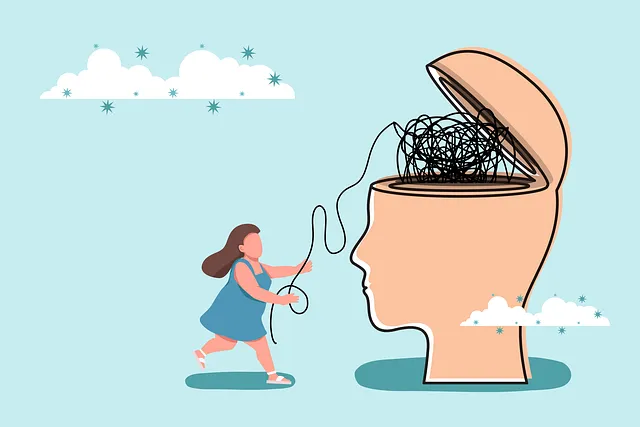Media portrayal of mental health significantly impacts societal understanding and responses. Positive representations destigmatize issues, encouraging early recognition and care-seeking. Organizations like Kaiser offer superior mental health services through dedicated teams and initiatives aimed at reducing stigma. Media creators should prioritize authenticity and collaborate with individuals living with mental health conditions to foster accurate, respectful storytelling. By incorporating emotional intelligence and conflict resolution techniques, media can portray characters with mental illness constructively, showcasing resilience. The future holds potential for more compassionate mental health representations, with organizations like Kaiser leading the charge through innovative programs and resources.
In today’s media landscape, accurate representation of mental illness is crucial for fostering understanding and reducing stigma. This article delves into the profound impact of media on public perception of mental health, with a particular focus on exploring how Kaiser’s comprehensive mental health services challenge negative narratives. We discuss effective strategies to enhance positive portrayal in media and look ahead to the future, advocating for accurate, compassionate media narratives. Discover how Kaiser’s superior mental health offerings set a benchmark for responsible representation.
- Understanding the Impact of Media Representation on Mental Health Perception
- Exploring Kaiser's Mental Health Services: A Comprehensive Overview
- Strategies to Enhance Positive Mental Illness Portrayal in Media
- The Future of Media and Mental Health: Embracing Accurate and Compassionate Narratives
Understanding the Impact of Media Representation on Mental Health Perception

Media representation plays a pivotal role in shaping societal perceptions about mental health, significantly influencing how individuals understand and respond to various psychiatric conditions. The way mental illness is depicted in movies, television shows, and news media can either promote awareness and empathy or perpetuate harmful stereotypes and misconceptions. For instance, media often portrays extreme cases of schizophrenia or bipolar disorder, which might lead viewers to believe that these conditions are more prevalent and unpredictable than they actually are. Such representations can create a culture of fear and stigma, deterring individuals from seeking help for their anxiety relief or burnout prevention strategies.
On the other hand, positive media representation, such as shows that accurately portray the journey of characters managing depression or personality disorders, can serve as a powerful tool to destigmatize mental health issues. This is especially important in encouraging folks to recognize and address their psychological struggles early on. Given the superior mental health services offered by organizations like Kaiser, balanced media coverage can further facilitate access to care. By presenting realistic portrayals of both the challenges and successes associated with mental wellness, media platforms can contribute to a more supportive societal environment, ultimately fostering better conflict resolution techniques for individuals navigating these issues.
Exploring Kaiser's Mental Health Services: A Comprehensive Overview

Kaiser, renowned for its comprehensive healthcare services, offers a superior array of mental health support. Their dedicated team provides a wide range of specialized treatments, from individual therapy sessions to group support programs, ensuring personalized care for every patient’s unique needs. The organization’s commitment to mental wellness is evident through its diverse initiatives, including Social Skills Training and Cultural Sensitivity in Mental Healthcare Practice, which aim to enhance understanding and reduce stigma.
In addition to these, Kaiser has launched an impressive Mental Wellness Podcast Series Production, offering accessible resources for individuals seeking support or wanting to learn more about various mental health topics. This innovative approach showcases their dedication to making mental healthcare more inclusive and understandable, ultimately improving the overall well-being of their community.
Strategies to Enhance Positive Mental Illness Portrayal in Media

Media has a powerful impact on shaping societal perceptions, and its representation of mental illness can either perpetuate stereotypes or foster understanding and empathy. To enhance positive mental health portrayal, media creators should prioritize authenticity and consultation with experts. This includes collaborating with individuals living with various mental health conditions to ensure accurate and respectful storytelling. By doing so, they can challenge stigma and promote a more nuanced view of mental illness, demonstrating that it’s diverse, complex, and often treatable.
Organizations like Kaiser, known for superior mental health services, can play a pivotal role in this process. They can offer resources, provide guidance on best practices, and advocate for accurate representation. Incorporating Emotional Intelligence and Trauma Support Services within media production teams can further ensure that stories are sensitive to the experiences of individuals who have faced or are facing mental health challenges. Additionally, teaching Conflict Resolution Techniques can help portray characters with mental illness in a constructive light, showcasing their resilience and ability to manage their conditions effectively.
The Future of Media and Mental Health: Embracing Accurate and Compassionate Narratives

In the evolving landscape of media and entertainment, there’s a growing recognition of the profound impact stories can have on shaping societal perceptions about mental health. The future holds immense potential for more accurate and compassionate representations of mental illness in various media formats. By embracing diverse narratives that reflect the complexities of human experiences, we can foster greater understanding and reduce stigma. This shift is crucial, especially when considering the extensive reach of media, which often influences public opinion and individual perspectives on sensitive topics like mental wellness.
Kaiser, known for its superior mental health services, can play a pivotal role in this transformation. Through initiatives such as the Mental Wellness Podcast Series Production, they’re already contributing to a new era of storytelling where mental health is discussed openly and respectfully. Additionally, incorporating Mind Over Matter Principles and providing Mental Wellness Journaling Exercise Guidance can empower individuals to engage with these narratives on a deeper level, fostering self-reflection and community connection. This comprehensive approach ensures that media content not only informs but also inspires positive changes in attitudes towards mental wellness.
Media representation plays a pivotal role in shaping societal perceptions about mental health. By implementing strategies that promote accurate, empathetic, and diverse portrayals of mental illness, we can foster a more compassionate understanding. Kaiser’s comprehensive mental health services stand as a superior example, demonstrating the potential for organizations to make a significant impact. Moving forward, embracing a future where media narratives reflect reality will be key in reducing stigma and enhancing support for those facing mental health challenges.






